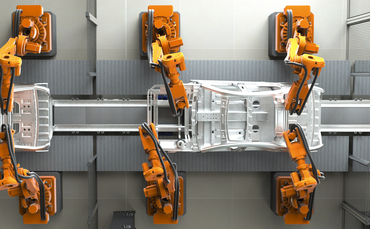Stay of execution for UK carmakers as EU proposes EV and battery tariff delay

The UK car industry has received a major boost today, after the European Commission offered a three-year delay to tariffs that were due to be imposed on the trade of new electric vehicles (EVs) and batteries across the English Channel from the start of next year.
The post-Brexit 'rules of origin' tariffs - which were adopted by the EU and UK in 2020 in a bid to incentivise investment in the bloc's battery manufacturing capacity - were due to come into force from January and would have imposed a 10 per cent levy on cars and batteries that fail to secure sufficient levels of domestic content.
Since Britain exited the EU, trade in EVs and batteries across the English Channel has been tariff-free under the Trade and Cooperation Agreement, and electrified vehicle trade between the two markets has more than doubled as the shift to cleaner road vehicles has accelerated.
But the spectre of new tariffs had sparked widespread concern within the UK car industry that fresh barriers were about to be erected around its largest export market, while green groups warned the move risked global car brands shifting their EV and battery manufacturing capabilities to the EU in a bid to avoid the looming levy.
But today the EU Commission proposed a special "one off" delay to the Rules of Origin requirements through to the end of December 2026, citing the unforeseen challenges faced by Europe's EV and battery supply chains in the wake of the Covid-19 pandemic, Russia's war in Ukraine, and increasing subsidy support from other major markets worldwide, most notably the Inflation Reduction Act in the USA.
The original policy was designed to try and curb the battery and EV markets' reliance on materials sourced from Asia. But the Commission said wider economic challenges "have led to a situation where the scaling-up of the European battery ecosystem has been slower than initially anticipated".
"We want our European industry to be leaders in the green transition," said Maroš Šefčovič, Executive Vice-President for the European Green Deal. "By providing legal certainty on the applicable rules and unprecedented financial support to European producers of sustainable batteries, we will bolster the competitive edge of our industry, with a strong value chain for batteries and electric vehicles. This is a balanced solution that protects the EU's interests."
The proposal offers a stay of execution for UK-based EV manufacturers giving them a further three years to build up domestic supply chain capacity so as to avoid the new tariffs.
The Society of Motor Manufacturers and Traders (SMMT) trade body called on the UK government to urgently adopt the EU Commission's "pragmatic solution" in order to avoid the "tariff cliff edge" currently looming at the end of this month for the domestic EV and battery sector.
"Such an extension would avoid damaging tariffs on the very vehicles we need consumers to buy, allow UK and EU manufacturers to compete with the rest of the world and, crucially, give the European battery industry time to catch up," said SMMT chief executive Mike Hawes. "Above all, voting for the proposal will enable us all to cut carbon emissions while supporting growth and jobs across the entire EV supply chain. We urge every party to get behind it."
In further positive news for the UK's burgeoning EV sector, the Department for Transport today confirmed plans to launch a £70m pilot scheme to boost the provision of ultra-rapid charging points at motorway service stations.
Led by National Highways, up to 10 trial sites are to receive a share of the funding to boost local power grid capacity to support additional EV chargers, which the government said would ensure local electricity network capacity is future-proofed through to at least 2035.
The announcement comes alongside the launch of a 10-week consultation today seeking views from chargepoint firms, motorway service station operators, and electricity suppliers on where EV chargers are most needed across England.
Transport Secretary Mark Harper, who announced the funding today on a trip to the COP28 Climate Summit in Dubai, said the £70m from the government's existing Rapid Charging Fund would cover a portion of the costs of upgrading local grid network capacity at motorway service areas.
"This government is on the side of drivers and working with the private sector to provide robust chargepoint infrastructure is part of our Plan for Drivers, with today's announcement paving the way for more ultra-rapid chargepoints," he said.
"This £70m pilot scheme is the starting point and sends a message to consumers and industry that we are investing wisely and rapidly to grow the future of transport in the UK."